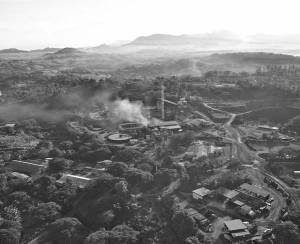Dave Paxton was so convinced he could turn around Fiji’s only gold mine that he left a comfortable job as a mining analyst at Hichens Harrison, London’s oldest stockbroking firm, to put his money where his mouth was.
The South-African mining engineer joined Vatukoula Gold Mines (VGM-L) as its chief executive at the height of the financial crisis in November 2008 — determined to resurrect the Vatukoula mine to its former glory when it was producing about 10% of Fiji’s gross domestic product.
The gold mine on the island of Viti Levu produced 7 million oz. gold over 74 years, but was shut down for economic reasons from December 2006 until April 2008.
On a recent trip to Toronto, Paxton said in an interview the mine turned out 59,658 oz. gold in the fiscal year ended Aug. 31, 2010.
In the first quarter of this fiscal year (Sept.-Nov.), 21,000 oz. gold were produced, and Paxton anticipates second-quarter production (Dec.-Feb.) will be about 25,000 oz. gold. (The goal is 85,000 oz. gold for the full 2011 fiscal year.)
Based on current resources and reserves, and an annual production rate of 100,000 oz. gold, Paxton calculates a mine life of about 43 years.
Currently, Vatukoula has resources of 8.3 million tonnes grading 10.5 grams gold per tonne in the indicated category and 4.7 million tonnes of 8.6 grams gold in the inferred. Reserves stand at 1.9 million tonnes of 10.9 grams gold.
Paxton believes there is significant exploration upside and earlier this year the company confirmed that it had acquired four additional drill rigs, lifting the total number to nine. In September, the company said new drilling to explore both surface and underground targets is planned to get underway in January 2011.
“There’s lots more here,” Paxton says. “This is a big mine that is very shallow and has massive potential. There are multiple layers of stacked ore.”
Emperor Mines owned and operated the mine for 71 years before shutting it down due to high mining costs and the large amount of capital required to sustain the operation.
In 2007, Emperor unloaded the gold mine for US$1 (and the assumption of liabilities) to junior Westech Gold, a private company in Australia, which planned to raise millions of dollars to restart operations. Westech Gold later sold the mine to River Diamonds, which was renamed Vatukoula Gold Mines.
The Fijian government is keen to have the London-headquartered company restore the mine to its former glory and is granting Vatukoula a five-year tax holiday, a three-year tax concession on import duties, and eliminating value-added tax on fuel. Royalties on gold sales are 3%.
Today the company is profitable with US$20 million cash in the bank and very little debt. For the year ended Aug. 31, 2010, net earnings reached US$21 million and cash costs were US$664 per oz. gold.
The critical problem at Vatukoula, however, is its high fixed operating costs. Paxton hopes to get those costs down to below US$600 per oz. by August 2012.
Labour is very inexpensive in Fiji (the mine’s general manager, the company’s highest-paid local employee, earns US$3,000 a month and overall labour costs are about 40-45% of what they are in South Africa), but fuel costs — specifically oil — are very high.
The company plans to replace diesel with “greener” energy and hopes to build a 25-megawatt, wood-fired power station on its property that would use wood chips from locally farmed Acacia trees.
Paxton believes the company could secure carbon credits to offset part of the US$40 million cost of building the plant, and says it could be in commercial production as early as 2013. Once completed, the cheaper power will cut costs by an estimated US$120 per oz.
Since 2008, Vatukoula has spent about $6 million a year on development costs and new equipment.
The company plans to co-list on a North American Exchange (Paxton won’t say which one) by January, following a 50-to-1 share consolidation (which will reduce its shares on the London Stock Ex- change to about 80 million from 4 billion today).
Currently, Sprott Asset Management holds about 18.3% of Vatukoula. Canadian Zinc (CZN-T, CZICF-O) owns about 15%.


Be the first to comment on "Vatukoula Gold seeks North American listing"